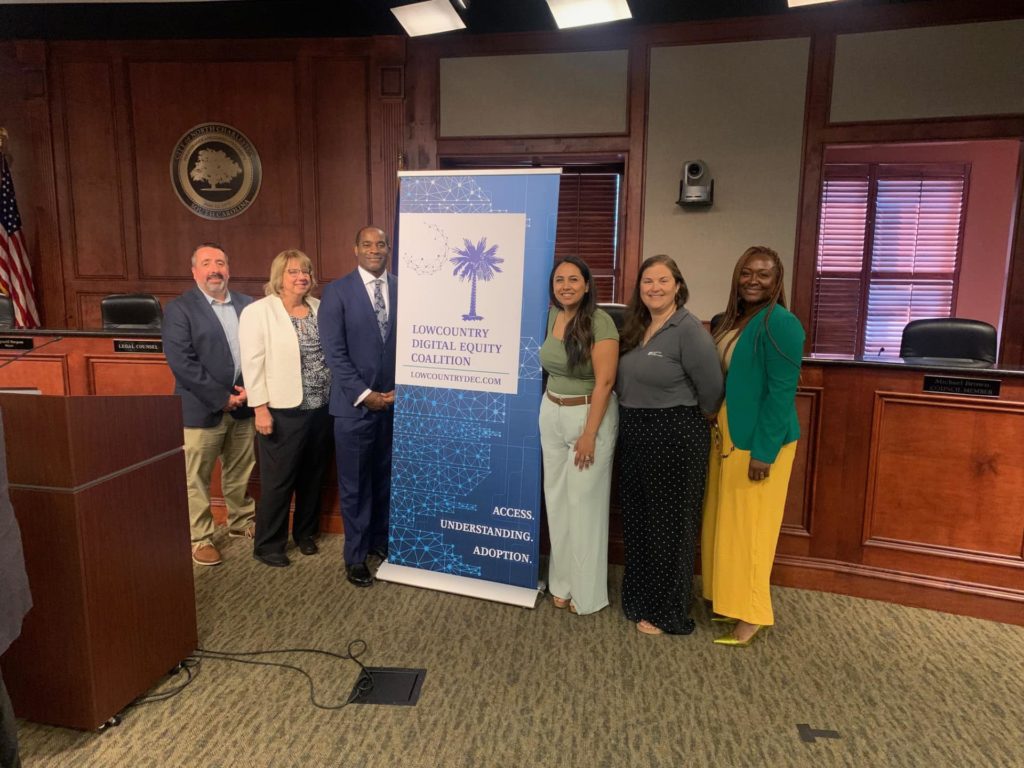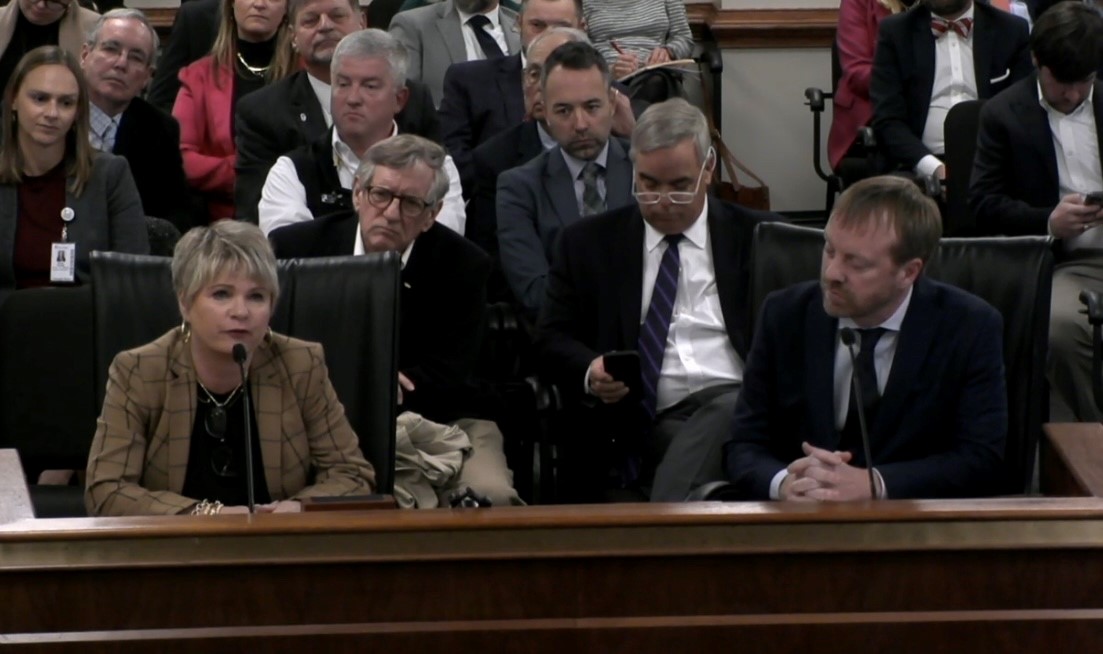


Source: Lowcountry Digital Equity Coalition
Stacey Lendbergh, LDEC Co-Manager
(Charleston, SC) – The LDEC membership have elected the inaugural Executive Committee to lead the regional alliance which represents a cross-sector of businesses, governments, and other community anchor institutions, dedicated to activities that ensure digital equity across Berkeley, Charleston, and Dorchester Counties.
The Executive Committee members are:
“The One Region Roadmap identified digital equity as a critical action area that must be addressed to create a resilient and prosperous economy that works for all residents. As One Region’s lead agent for digital equity, the Lowcountry Digital Equity Coalition (LDEC) has taken action that has positively impacted residents of our region and helped inform South Carolina’s stated digital equity goals. This formalization of LDEC gives us the structure and support to reach those in need faster and in more meaningful ways,” Ryan Wilcox, BCDCOG and Managing Director of One Region.
As a component of its mission, The LDEC will lead and support regional efforts to:
About The Lowcountry Digital Equity Coalition:
The Lowcountry Digital Equity Coalition (LDEC) is a regional public-private partnership responsible for setting and conducting the strategic priorities of the tri-county in the Charleston/N. Charleston MSA on matters related to digital inclusion. The LDEC is managed by backbone agency, Tri-County Cradle to Career Collaborative (TCCC).
Teddy Hodge, a dedicated Network Analyst at Palmetto Care Connections (PCC), took center stage at Carolina Springs Elementary for Career Day. With enthusiasm, he shared his journey, and the vital role PCC plays in serving rural and underserved communities across South Carolina. Through engaging anecdotes and insightful discussions, Teddy showcased how PCC’s staff harnesses technology to bridge healthcare gaps, bringing essential services to those in need.
Palmetto Care Connections written by Campbell Mims, Sweatman Strategies, LLC
In the quiet rural outskirts of Estill, South Carolina, Brittney navigated her life as a dedicated mother of three boys. Juggling parenthood, work, and health concerns, she found herself facing numerous challenges, especially when it came to accessing medical care for herself and her family. But amidst the trials of rural living, a glimmer of hope emerged in the form of digital literacy education offered by Palmetto Care Connections (PCC).
 Brittney’s journey with PCC began unexpectedly, stemming from a simple checkbox on a Medicaid form. Little did she know, this decision would open doors to invaluable resources and opportunities. Initially hesitant about her technological prowess, Brittney embarked on the digital literacy class with curiosity and a desire to learn.
Brittney’s journey with PCC began unexpectedly, stemming from a simple checkbox on a Medicaid form. Little did she know, this decision would open doors to invaluable resources and opportunities. Initially hesitant about her technological prowess, Brittney embarked on the digital literacy class with curiosity and a desire to learn.
As she delved into the course, Brittney discovered a world of possibilities unfolding before her. Initially drawn to the idea of leveraging technology for medical purposes, she soon realized the broader implications of her newfound skills. “Having that information at my fingertips allows me to have control over my well-being,” Brittney said. Through telehealth appointments and easy access to medical records via her tablet, Brittney gained a newfound sense of control over her family’s healthcare journey.
The impact of the digital literacy class transcended mere convenience; it became a lifeline during critical moments. When her youngest son fell ill, Brittney’s ability to access and share his medical history with healthcare providers proved instrumental in diagnosing and treating his condition effectively. “It just kind of empowers you more as the patient,” stated Brittney. What once seemed like an insurmountable challenge in rural healthcare now became manageable, thanks to the knowledge she gained.
But the class didn’t stop at healthcare—it empowered Brittney to take charge of her overall well-being. Armed with the ability to track her health metrics and access medical resources, she embarked on a journey towards a healthier lifestyle. By leveraging her digital literacy skills to monitor her progress and make informed decisions, Brittney shed light on the transformative potential of education and technology.
Reflecting on her experience, Brittney emphasized the importance of providing not just resources but also the necessary training and knowledge to utilize them effectively. “”If you give me something and you explain to me what I need to do to make this work for me then I’m good to go.,” remarked Brittney, a sentiment shared by other participants as well. She likened it to giving someone a bike without teaching them how to ride it—a sentiment that resonated deeply with her journey with PCC.
In the end, Brittney’s story epitomized the transformative power of education and technology in empowering individuals, especially those in underserved communities. Through PCC’s digital literacy class, she not only gained practical skills but also found a newfound sense of confidence and agency in navigating life’s challenges—one digital step at a time.
Source: Post and Courier
#InTheNews: This just in- “Whether you die prematurely or live a long time in South Carolina depends on where you reside.” With the rising rate of premature deaths across South Carolina, read this article from The Post and Courier to find out where your county ranks for life expectancy.
PCC aims to improve access to healthcare for rural populations in South Carolina, a goal that becomes even more critical in light of data showing disparities in life expectancy and health outcomes across different regions of the state.
Source: Healthcare Finance
#InTheNews: Read all about the challenges and solutions associated with digital and telehealth access. Even with the rapid advancement of telehealth technology, there’s a notable disparity in access and digital health literacy among different patient populations, affecting their engagement with telehealth services.
PCC is committed to expanding access, improving digital literacy, and ensuring that everyone can benefit from telehealth advancements. The focus on addressing the digital divide and improving digital literacy among patient populations mirrors PCC’s objectives to ensure that all individuals, regardless of their socioeconomic status, location, age, or race, can access healthcare services effectively and efficiently.
Read the Healthcare Finance article here:
Want to learn more about how Palmetto Care Connections works with partners like the South Carolina Department of Health and Human Services to improve access to healthcare services in rural and underserved areas? Watch ⬇️
Written by: Campbell Mims, Sweatman Strategies, LLC
In a collaborative effort to bridge the digital divide, 60 residents of Hampton County recently underwent a transformative training initiative hosted by Palmetto Care Connections, a nonprofit telehealth network. Held on January 30 and February 1 at the Hampton County Library, the program aimed to expand digital navigation services in the community.
Each participant was equipped with a tablet and received beginner tablet training to empower them in the digital realm. As a significant boost, all attendees were granted 12 months of free internet access, fostering a sustainable connection to the online world.
This initiative, made possible through funding from LISC (Local Initiatives Support Corporation), not only enhances individual digital literacy but also contributes to the broader goal of creating a digitally inclusive and empowered community in Hampton County. The ripple effects of this forward-looking effort are poised to be felt across various aspects of residents’ lives, from education to employment opportunities.

Pictured above: Co-Chairman of the SCTA, Kathy Schwarting and Dr. Jimmy McElligott testifying before a subcommittee of the Senate Medical Affairs Committee.
Source: Campbell Mims, Sweatman Strategies
In coordination and collaboration with the South Carolina Telehealth Alliance and other stakeholders, Palmetto Care Connections (PCC) has actively supported H. 4159: Telehealth and Telemedicine Modernization Act. The bill outlines the following regulatory goals:
On Jan. 24, 2024, the Senate adopted the Committee amendment of H. 4159, and the bill received a second reading as amended. On Jan. 25, the bill was read a third time and returned to the House with amendments with a roll call of Ayes 41; Nays 0. The House concluded in the Senate amendments on H. 4159. Having received a third reading in both chambers, the bill as amended was enrolled by the house on Wednesday, Jan. 31. The bill now travels to Gov. Henry McMaster’s desk for his signature of approval.